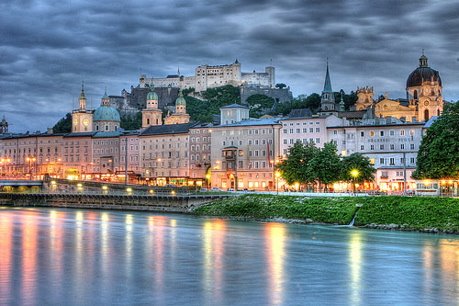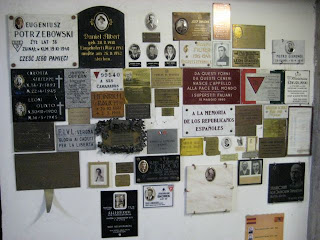 We had a grand Thanksgiving celebration here, transforming the student lounge of one of the student dorms into a festival hall. It was a daunting task, but the students all pitched in, baking a multitude of desserts and cooking side dishes (the turkey and vegetables were brought), while we transported much of our kitchen (silverware, plates, glasses, washing up supplies, serving bowls) as well as beverages galore and vegetarian stuffing and gravy across the city.
We had a grand Thanksgiving celebration here, transforming the student lounge of one of the student dorms into a festival hall. It was a daunting task, but the students all pitched in, baking a multitude of desserts and cooking side dishes (the turkey and vegetables were brought), while we transported much of our kitchen (silverware, plates, glasses, washing up supplies, serving bowls) as well as beverages galore and vegetarian stuffing and gravy across the city. When all was said and done, 28 people had a Thanksgiving dinner, with ages from 3 to the 80s, with American students, Austrian and Italian roommates, families, professors, and youth all mixed together. We had both sweet potatoes and pumpkin pie, both made from scratch, the sweet potatoes discovered at Thursday's outdoor farmer's market (you cannot buy sweet potatoes in stores here) and the pumpkin carefully cooked up (you cannot buy canned pumpkin here).
When all was said and done, 28 people had a Thanksgiving dinner, with ages from 3 to the 80s, with American students, Austrian and Italian roommates, families, professors, and youth all mixed together. We had both sweet potatoes and pumpkin pie, both made from scratch, the sweet potatoes discovered at Thursday's outdoor farmer's market (you cannot buy sweet potatoes in stores here) and the pumpkin carefully cooked up (you cannot buy canned pumpkin here).  There was more turkey than I've ever seen before, not carved into thin slices American style, but cut into big chunks with enormous turkey wings for those who like to eat with their hands. It was a most excellent extravaganza. We all had a good time, and we ate way too much good food. You can take Americans out of America, but you can't take the American out of Americans. Does that make sense?
There was more turkey than I've ever seen before, not carved into thin slices American style, but cut into big chunks with enormous turkey wings for those who like to eat with their hands. It was a most excellent extravaganza. We all had a good time, and we ate way too much good food. You can take Americans out of America, but you can't take the American out of Americans. Does that make sense? With Professor Roggenbauer in attendance, I couldn't help but think of the Erntedankfest we had 18 years ago. Roggenbauer took us to his hometown of Gmunden where we had a huge feast at a restaurant overlooking the Lake Gmunden. Although the make-up of the group was different (we were 36 students compared to today's nine), there were so many similarities.
With Professor Roggenbauer in attendance, I couldn't help but think of the Erntedankfest we had 18 years ago. Roggenbauer took us to his hometown of Gmunden where we had a huge feast at a restaurant overlooking the Lake Gmunden. Although the make-up of the group was different (we were 36 students compared to today's nine), there were so many similarities. Homesickness sets in this time of year. The students miss their families very much. Whereas we sang songs back in 1990, this group danced together and played games. Both groups laughed and laughed throughout the night. I'm happy to say that there was a little more of 1990 in the group than just Roggenbauer and me. My old buddy Scott Davidson was there with his Austrian wife, Alex. Scott and lived a short bike ride away from one another all those years ago. Scott told tasteful, but amusing stories of our time in Salzburg, some of which I hadn't thought of in years.
Homesickness sets in this time of year. The students miss their families very much. Whereas we sang songs back in 1990, this group danced together and played games. Both groups laughed and laughed throughout the night. I'm happy to say that there was a little more of 1990 in the group than just Roggenbauer and me. My old buddy Scott Davidson was there with his Austrian wife, Alex. Scott and lived a short bike ride away from one another all those years ago. Scott told tasteful, but amusing stories of our time in Salzburg, some of which I hadn't thought of in years. It was our plan from August to have two major program trips this semester, one in September when the students first arrive (Innsbruck) and one directly following Thanksgiving. Wien is a great city, one that Jenny and I had visited separately, but during the same season of the year: winter. Wien abounds with Christmas markets and there's one more spectacular than the rest: the one in front of the Rathaus, or city hall. There are more stands than you can shake a hot cup of Glühwein at (you wouldn't want to do that anyway), and there are even rides for the kiddies.
It was our plan from August to have two major program trips this semester, one in September when the students first arrive (Innsbruck) and one directly following Thanksgiving. Wien is a great city, one that Jenny and I had visited separately, but during the same season of the year: winter. Wien abounds with Christmas markets and there's one more spectacular than the rest: the one in front of the Rathaus, or city hall. There are more stands than you can shake a hot cup of Glühwein at (you wouldn't want to do that anyway), and there are even rides for the kiddies. We knew that the students, coming off one holiday, would like to experience a bit of the next holiday together. Many a Christmas present was shopped for in our two days there. And we also had time to visit the museum Haus der Musik, the Zoom Kindermuseum, and see the opera "Tosca" at the Wiener Staatsoper. During their free time, the students visited a number of interesting places such as Schloß Belvedere, the Sigmund Freud Museum, and a Gustav Klimt exhibit.
We knew that the students, coming off one holiday, would like to experience a bit of the next holiday together. Many a Christmas present was shopped for in our two days there. And we also had time to visit the museum Haus der Musik, the Zoom Kindermuseum, and see the opera "Tosca" at the Wiener Staatsoper. During their free time, the students visited a number of interesting places such as Schloß Belvedere, the Sigmund Freud Museum, and a Gustav Klimt exhibit.
And some students just got lost for the day which is okay, too. There's nothing quite like popping in and out of European street cars and subways and just walking around in a new part of a new city. The moment things start getting old, you dip down into another subway station, ride for a couple of stops and end up in a different looking city.

Something I wanted to say but didn't during my Thanksgiving speech on Thursday (mostly because I like to avoid saying things that choke me up) was that although we were hosting so many Austrians at our Thanksgiving dinner, we were still THEIR guests. We are living in their country, their city, eating main dishes prepared by an Austrian caterer, eating desserts made with Austrians ingredients. Yes, living with people from a different culture can be a challenge, but I wanted to say that my experiences on the whole with Austrian people were mostly very positive, and I'm thankful for that.
 When I was a student here 18 years ago, I was poor. If it hadn't been for one family, the landlords of a friend of mine, I would've been one hungry kid that year. They constantly were telling me to come to lunch or dinner. My own landlady was also wonderful to me and my two American housemates. During the first Gulf War (1991), she invited us into her a warm living room every night to watch the news. When the war only lasted a month, we thought that that meant the end of the invites. But no, she basically told us to come in anytime after dinner and turn off the TV when we went to bed.
When I was a student here 18 years ago, I was poor. If it hadn't been for one family, the landlords of a friend of mine, I would've been one hungry kid that year. They constantly were telling me to come to lunch or dinner. My own landlady was also wonderful to me and my two American housemates. During the first Gulf War (1991), she invited us into her a warm living room every night to watch the news. When the war only lasted a month, we thought that that meant the end of the invites. But no, she basically told us to come in anytime after dinner and turn off the TV when we went to bed. I'm thankful for having a family to share Thanksgiving with and an extended family of students and people who have come to care for them. Someday the students will go home to Maine, New Hampshire, and Virginia and remember this Thanksgiving and Wien, I think, fondly.
I'm thankful for having a family to share Thanksgiving with and an extended family of students and people who have come to care for them. Someday the students will go home to Maine, New Hampshire, and Virginia and remember this Thanksgiving and Wien, I think, fondly. 









